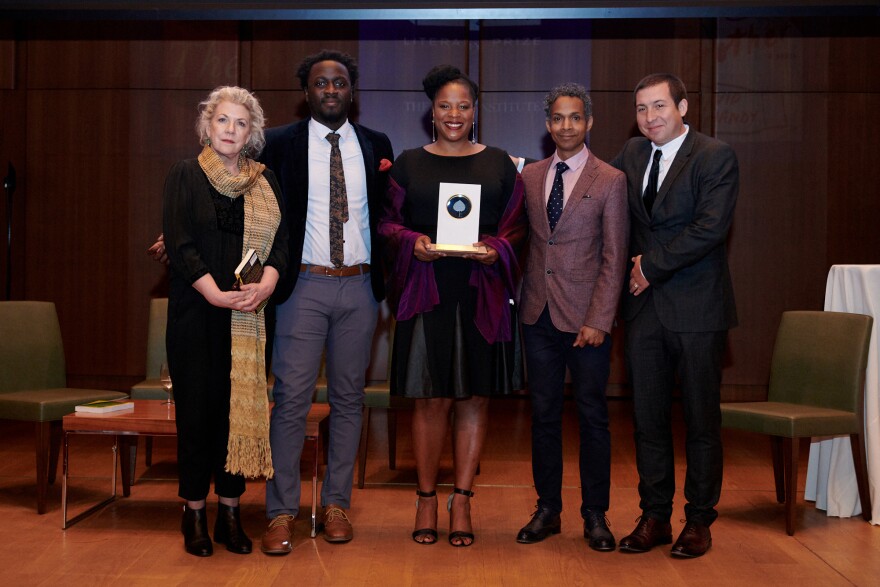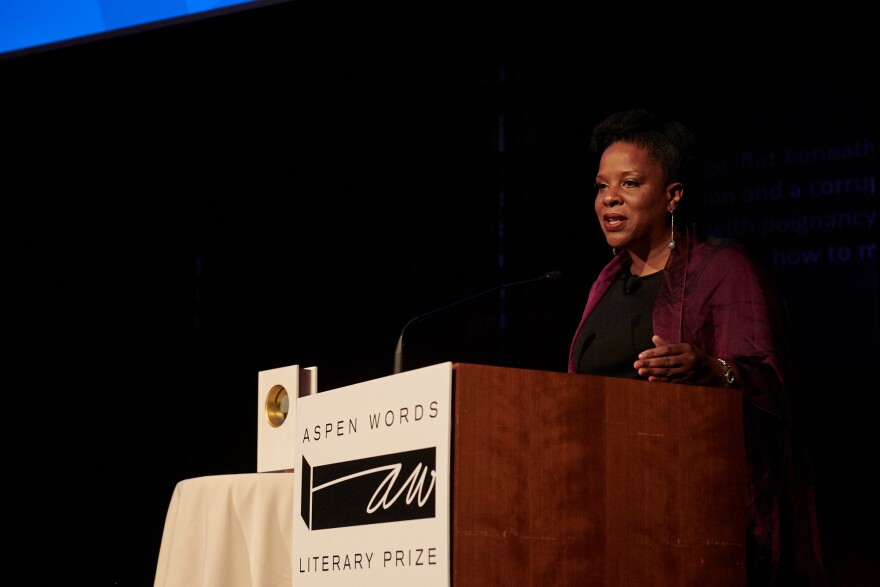Update at 5:55 p.m. Mountain time on Thursday: Dawnie Walton won the Literary Prize for her novel "The Final Revival of Opal and Nev." In her acceptance speech, she referenced a quote by Nina Simone, one of the inspirations for the character Opal: "An artist's duty, as far as I am concerned, is to reflect the times."
Original story:
One of the five finalists for the prestigious Aspen Words Literary Prize will win $35,000 by the end of Thursday.
The annual award goes to the author of a work of fiction that addresses an important social issue, such as global inequality or racism. The stories aren’t true, but the characters and plotlines of the five finalists feel like they could be.
Author Dawnie Walton was inspired by the very real erasure of Black women from the history of popular music, such as Ednah Holt and Lynn Mabry.
They performed on the Talking Heads' live album and concert film “Stop Making Sense."
The band is probably best known for the bizarre performance of frontman David Byrne, “But then you see to his side, there are two black women who look like they could have been my aunts,” Walton said. “I had the strangest urge in that moment to reach into the screen and pull one of them to center stage with him, and just see what would happen between them.”
The scene inspired Walton to write “The Final Revival of Opal and Nev.” It’s about an imagined duo — Opal Jewel, a Black woman from Detroit, and Nev Charles, a white man from the United Kingdom.
“The narrative follows their brief rise to fame, the concert that puts them on the map and their spectacular flame-out,” she said. “And what happens when they decide to reunite in 2016 for a reunion show, and all the secrets that come to light as they're making that decision to get back together or not.”
Another prize finalist, Myriam Chancy's “What Storm, What Thunder,” focuses on the people of Haiti in the aftermath of the deadly earthquake in 2010. It’s a more human portrayal of Haitians reacting to disaster than the ones often found in mainstream media.
Chancy wanted to move beyond a framing she thinks is overused for Haiti: "resilience.”
The story follows a series of characters inspired by real Haitians.
“People react differently to extreme conditions,” Chancy said. “And so the novel tries to depict the range of responses to something that's as cataclysmic as you know, this earthquake, which killed so many people, recorded a million people.”
Reading fiction builds empathy, according to one of the 2022 Literary Prize judges, Ann Friedman.
But the winning book doesn’t just tell a compelling story with relatable characters . It does it in a way that hasn’t been done before, Friedman said.
“Did the author try to do something new and innovative in writing the work, and did they pull it off?” she said. “Is it awkward or stilted, or is their new idea that they introduced sort of natural and organic to the issue that's being written about or to the people whose lives you're exploring?”

Like Chancy’s book, author Omar El Akkad’s book “What Strange Paradise” also focuses on real people who are often abstracted and dehumanized by the news media: refugees.
The story follows two children, Amir and Vänna. Amir narrowly survives the deadly sinking of a boat overloaded with refugees before running into Vänna. Although they speak different language, they form a close bond in the face of staggering odds.
El Akkad brings to life a story that, in the real world, would probably be told as a 500-word news brief without any names.
“I think it's a natural effect of fiction — and literature, in general — to expand the definition of what it means to be human,” he said. “I don't think you can write a novel and not be engaged in that kind of undertaking in one way or another.”
He started working on the book in 2012 and continued through the Trump administration when, he said, there were so many scandals that they became hard to keep track of.
“I wanted to write a book that was positioned against … what is essentially a privilege — the privilege of instantaneous forgetting,” he said. “This notion that it is good enough to be outraged about an injustice one day and then move on to the next one.”
Also on the shortlist this year is Hala Alyan’s “The Arsonists’ City.”
The book follows a Syrian-Lebanese-American family scattered across the globe. They reunite in Beirut, where long-standing secrets and emotions come to the surface.
It’s fitting that Alyan would craft a narrative about how a family copes with extreme emotions. She is a practicing clinical psychologist and teacher.
“I spend a lot of time in the classroom working with people on their narratives in multiple ways, and then in the therapy room, working with people on their narratives and low points, and then trying to create narratives myself,” she said.
Her expertise makes the characters in the book feel all the more real.
“One could argue that all of the characters of this book — certainly the matriarch or the patriarch — have experienced trauma with their exposure to war,” she said. “There's a mechanism of ‘stuckness’ that gets played out, so there is no real 'Time' — capital ‘T’ — when it comes to people who've been traumatized. … You'll find people having flashbacks.”
Kirsten Valdez Quade’s “The Five Wounds” also explores family dynamics.
“One of my obsessions as a writer is family,” she said. “How children and grown children and parents are constantly navigating old patterns.”
The book follows the Padillas, a devout Roman Catholic family with a history of domestic abuse, addiction and financial hardship. Then one of the characters, Angel, has a baby.
"One of the questions that really compelled me about the Padillas was: How does this family change these old patterns and begin to heal?” she said. “And one of the things that changes for this family is that Angel, at age 16, has her baby, and every single person in that family has to step up to meet the needs of this child in new ways and unexpected ways.”
The Literary Prize winner will be announced Thursday, but first, the authors will take part in a roundtable moderated by NPR All Things Considered Host Mary Louise Kelly.
The in-person event is in New York, and Aspen Words holds a watch party at Pitkin County Library from 4 to 6 p.m.




